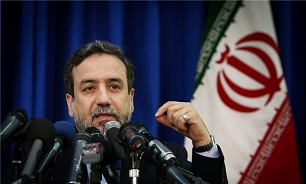Iran Urges Europe to Pay Dues under N. Deal
 Talking to the Dutch NRC website, Araqchi said that his country had paid its dues as it is contractually required to under the agreement, officially known as the Joint Comprehensive Plan of Action (JCPOA), adding, “Now, it is the other JCPOA parties’ turn to do the same.”
Talking to the Dutch NRC website, Araqchi said that his country had paid its dues as it is contractually required to under the agreement, officially known as the Joint Comprehensive Plan of Action (JCPOA), adding, “Now, it is the other JCPOA parties’ turn to do the same.”
“We accepted to limit our nuclear program [under the JCPOA], but were made a target of the United States’ maximum pressure [campaign] in return. In such circumstances, the JCPOA’s other partners are bound to think up practical approaches to extricate Iran from the sanctions,” the official noted.
European countries, he added, claim they seek to save the agreement, but so far, they have actually shown that they are either incapable or disinclined to resist the US dominance over Europe’s financial system to protect it.
The Iranian nuclear negotiator added that the 2015 deal is in conditions resembling an “intensive care” unit, adding that the European signatories to the deal must scramble to save the accord.
The deal between Iran and the P5+1 group of states -- the United States, the UK, France, Russia, and China plus Germany – was signed on July 14, 2015, stipulated the removal of sanctions against Tehran, which voluntarily changed some aspects of its nuclear energy program.
The United States, however, left the deal last May in a move that flew in the face of the agreement’s multi-party nature, and the fact that the accord has been ratified in the form of a UN Security Council resolution. The US also returned its sanctions against Iran, and the European deal partners fell into line with the American bans by abandoning their business commitments to Tehran.
Elsewhere in his remarks, Araqchi said the recent developments concerning the nuclear accord had taught Iran, inter alia, that “the result of this agreement and commitment to it [for Iran] has been coming under new sanctions.”
“Should things continue to proceed like this, we too may be forced to change our approach,” he stated.
This May, Iran began reducing its JCPOA commitments under a step-by-step schedule in reaction to the US’ withdrawal and the European side’s failure to honor their side of the deal.
The Islamic Republic has repeatedly asserted that it would roll back all the retaliatory steps it has taken once the European countries begin meeting Iran’s business interests as the deal demands them.
Earlier this month, Iranian Supreme Leader's top adviser for international affairs Ali Akbar Velayati lashed out at the European states, specially France, for their mere verbal support and inaction to implement the nuclear deal with Iran.
Velayati made the remarks in an interview with the Arabic-language service of France 24 channel.
He said that Iran does not trust France as it has not abided by its commitments to the Iran nuclear deal or the JCPOA like other European countries.
French President Macron had been holding regular phone conversation with his Iranian counterpart President Rouhani with an attempt to save the JCPOA as Iran gradually took steps to reduce its own commitments to the deal in reciprocation for US illegal withdrawal and Europe’s failure to abide by their own obligations under the accord to make up for Iran’s losses.
In response to a question on the promised $15 billion credit line proposed to Rouhani by Macron in exchange for reversing Iran’s JCPOA commitment reductions, the top advisor to the Leader said that “the main problem is that France and other European signatories to the JCPOA do not keep their promises. Nor did they live up to their promises in the nuclear deal. That is why we do not trust the French government to hold to its promises”.
He added that France like other EU countries are all talk and no action.
“France is seeking a political game with Iran,” he noted, adding as long as France does not take practical steps, Iran does not trust it.
In relevant remarks two days earlier, Iranian Ambassador to London Hamid Baeedinejad warned that the three European states of Britain, France and Germany's lagging in implementing their undertakings is leading the nuclear deal towards an abyss.
"Non-implementation of commitments by the EU3 is moving the nuclear deal towards a very dangerous situation," Baeedinejad wrote on his twitter page, explaining that it was a part of his interview with the Sky News.
"Iran reduces its obligations through reversible steps to give time to other parties to implement their obligations and stand up to salvage the deal," he added.
Message end/
